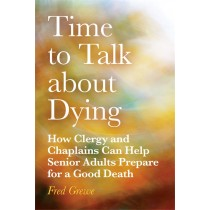 F. Grewe, Time to Talk about Dying: How Clergy and Chaplains Can Help Senior Adults Prepare for a Good Death. London and Philadelphia, PA: Jessica Kingsley Publishers, 2018. Pp. 168. Pb. £18.99. ISBN 978-1-78592-805-5.
F. Grewe, Time to Talk about Dying: How Clergy and Chaplains Can Help Senior Adults Prepare for a Good Death. London and Philadelphia, PA: Jessica Kingsley Publishers, 2018. Pp. 168. Pb. £18.99. ISBN 978-1-78592-805-5.
In most books, it becomes clear how far its writer knows the geography, the contours and the sense of direction in the field of study which they seek to open up for their reader. When it comes to the geography of death and dying, there are plenty of writers who offer maps for such a journey. The field is saturated with many fine guides. So a text which captures attention, reveals a wealth of grounded practice and has the potential to be used for spiritual and pastoral accompaniment, deserves commendation. This is a generative book, carefully written, well organised and rich in lived pastoral experience among those preparing for death. Its focus – enabling adults to enrich later age by considering what a good death might look like – is carried through in ten chapters. Fred Grewe invites his readers into a process of reflexivity which asks what we might want to leave behind for those who care about us and how we might be remembered after we die. In and through the exercises which have been tested with a wide range of individuals and groups, there is a commitment to affirming and celebrating what is precious and lasting in relationships. This is all done within an acknowledgement of the isolation, uncertainty, meaninglessness and pain of change, grief and loss. The chapters bear significant testimony to the author’s experience. The use of personal experience is appropriate and sensitive. There is a practical wisdom here which can be trusted as it is applied with honesty and insight. While acknowledging the cultural differences between the UK and the USA, much of the material in this book travels well. I can see it being put to good use in the training of pastors and ministers. It could form the basis of an innovative parish or community course in order to provide a safe framework within which we befriend the older stranger within us, living with boundedness and mortality. As the relationship between religion and its wider culture weakens in terms of both credibility and relevance, communities of faith would do well to explore where their strengths lie. What makes the life of those who believe distinctive, and how might theology be put to work for human flourishing? Those who teach theology would do well to explore how practical theology as opened up and explored in this book might be a force for the nurture of imagination in all our relationships but especially with our mortality. Enabling individuals and groups to create time to talk about dying could in and of itself be renewing for our understanding of religion and its practical application for our journey towards wholeness.
Sarum College, Salisbury, and University of Winchester James Woodward
